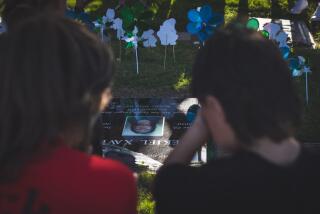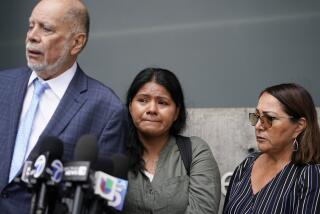How to Get Harm Out of Children’s Way
- Share via
More than a million children under age 6 are poisoned accidentally in their homes each year, although no more than a handful of cases prove fatal.
But the peril exists in most homes, and parents should take special precautions to prevent accidental poisoning.
Young children in the home often grab and pull at anything they can reach. So the rule of thumb is that anything children can get hold of will go directly from hand to mouth.
With this in mind, medicines and detergents should be stored in areas that a child can neither reach nor open.
All laundry detergents, bathroom and kitchen cleaners, and medicines should be kept in cabinets or on shelves that are inaccessible to children.
Potentially poisonous materials, for example, should not be kept under the kitchen sink. These items should be contained in a locked cabinet or on a shelf high enough to be out of the reach of children.
Hazardous products should be stored in their original containers. Chemicals should never be put into old milk or soda bottles, where a child could confuse the hazardous chemical content with a beverage.
Daily doses of medication should not be placed on the breakfast table or laid out in plain view of a child.
There are steps to take ahead of time to prepare for a possible accidental poisoning:
* Write down the number of the Orange County Poison Control center (714) 634-5988, then stick the number directly on the telephone. Make sure that the number is correctly copied. Do not expect to be able to find the phone book and the poison control number quickly if and when a poisoning happens.
* If a child swallows something that might be poisonous, the local poison control center should be called immediately.
* Keep syrup of ipecac in the home; it is a medicine that induces vomiting. But don’t give it to a child unless instructed to do so by the poison control center or your pediatrician.
When calling the poison control center, be ready with the child, the ipecac and the poisonous product’s container.
The container that held the potentially harmful substance is important because the label should contain a list of ingredients. This content information may help the poison center treat your child more effectively.
If you cannot find the container, just call the center, and people there will help you narrow down the possible extent of the child’s poisoning and help you remedy the problem.
More to Read
Sign up for Essential California
The most important California stories and recommendations in your inbox every morning.
You may occasionally receive promotional content from the Los Angeles Times.










